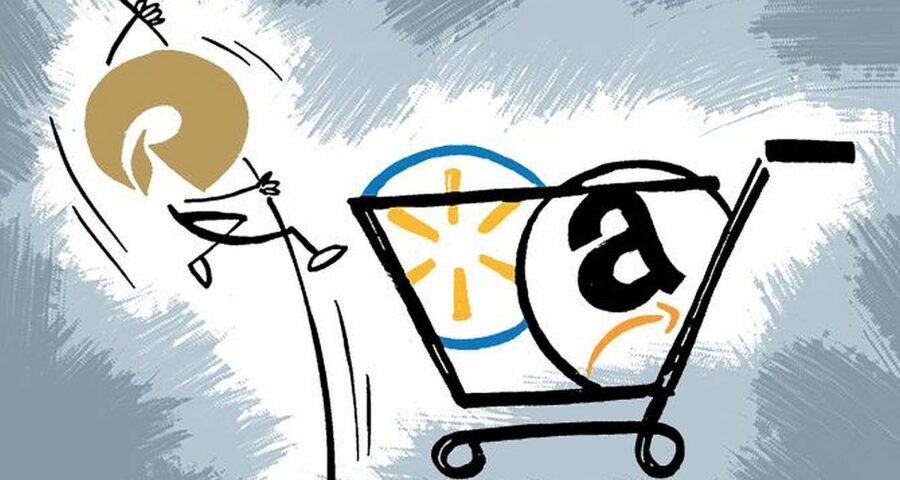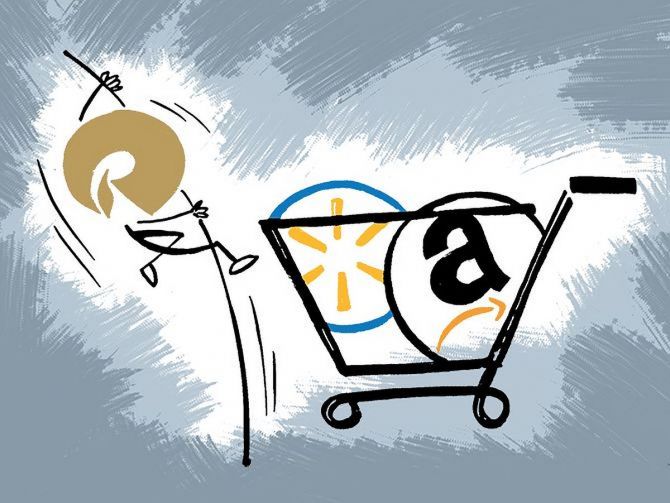‘We are having an outsize impact not only on the lives of the customers and livelihood, but also the economy of India.’
Amit Agarwal, senior vice president and country head, Amazon India, sees his role along with his team at the e-commerce giant as a rare chance amid pandemic to solve challenging problems and create meaningful impact on people’s daily lives and livelihoods.
In an interview with Peerzada Abrar, Agarwal said the pandemic has provided a structural shift for more customers and small businesses to come online.
How do you see the impact and growth of e-commerce and Amazon in India since the outbreak of the pandemic?
The last 15 months have been challenging, especially the last few weeks.
Though infection rates are coming down, it is clearly nowhere close to normal.
As an organisation, our priority during the Covid wave-2 was pivoted to keep our employees safe and simultaneously serve the daily lives of our customers and serve the livelihoods of our business partners and small businesses.
We also helped the community and the government to manage the crisis.
We have an initiative called ‘Mission Vayu’, which is using our global logistics capability to procure, purchase and transport medical equipment.
We are also constructing medical oxygen plants in three states and hopefully we would be able to scale that up, based on the learnings.
We have committed to promote the vaccination costs for over one million people.
It not only includes our employees and dependents and frontline associates, but also our logistics partners and small businesses that sell on our Web site.
What has really come out during this Covid is that customers and small businesses rely on us more than ever before.
We just completed eight years in India.
Small businesses are using Amazon to go online and to go regional, national and even global.
We have already digitised nearly 2.5 million SMBs (small, micro and medium businesses), enabled $3 billion in exports and created a million jobs since the launch.
Last year itself, which was a very challenging year, we estimate that more than 300,000 SMBs came online through Amazon, and we enabled $1 billion exports and created 300,000 jobs.
We are having an outsize impact not only on the lives of the customers and livelihood, but also the economy of India.
We want to use technology to empower businesses and serve customers.
What kind of growth is being driven by new consumers in tier-2, tier-3 towns and beyond?
Covid provides a structural shift to us, as we see more customers and small businesses come online.
Covid is probably going to propel India faster towards a Digital India and enable ‘Make in India’ go global and create robust digital global businesses.
Inspired by this we actually pledged last year that we will take 10 million SMBs online, enable $10 billion in exports and create two million jobs by 2025.
We see ourselves as a very integral partner in India’s economic journey.
More customers are shopping online with us than ever before.
The number of businesses coming online (compared to pre-pandemic) went up by 50 per cent.
There is definitely an acceleration and a structural shift.
Even before the pandemic, we have been focusing on enabling Amazon shopping experience in local languages.
We have introduced Alexa on the shopping app, so that customers can speak to search products and (shop).
We have been adding videos and investing in digital payments, so that more customers can use Amazon for their daily needs.
We are also providing seller services in many languages.
We have launched ‘Local Shops’ programme on Amazon.
It allows local stores to use Amazon as their online store front.
We have also seen a strong momentum in our global selling service where manufacturers and brands in India are taking their products to customers globally.
That service has grown very rapidly. The first $1 billion exports took up to three years, the next $1 billion took 18 months and in the last 12 months we crossed $1 billion in exports.
You also launched Amazon Academy and expanded food delivery service Amazon Food, what kind of demand and growth are seeing for such initiatives?
We’re always testing new ideas and services.
People who have used Amazon Academy, love it.
It offers a sophisticated way for customers to prepare for their exams.
Similarly Amazon Food is only active in Bengaluru.
We are seeing a strong adoption by Prime members.
They love the service and it’s great for them to get free delivery on their food orders.
We see repeat usage every month.
We are also excited that restaurants are happy with the service.
We’re very excited by the early feedback that we are getting.
We continue to monitor them to decide on scaling them up in the future.
What role do you see Amazon can play to improve access to healthcare amid this pandemic such as delivery of medicine and even vaccines?
We are already testing a service called Amazon Pharmacy in Bengaluru.
We are getting useful customer feedback and good positive early signals.
We are cognisant that it is a need that customers want Amazon to service and we are constantly looking at the ways to do that.
Besides Flipkart, Reliance’s JioMart and Tata Group, are also now betting big on e-commerce and making acquisitions and forming strategic partnerships. Your comments?
E-commerce is really early. It is less than 3 per cent of the overall consumption.
There are going to be many winners and business models as we look forward.
Competition is good for customers.
It actually offers them a choice and better service.
Our focus has always been on obsessing with customers and inventing on their behalf, and investing long term.
That approach has worked well. We are excited about the momentum we have as India’s largest, most transacted and trusted marketplace built over the last eight years.
We remain paranoid everyday, whether there is competition or not, that customers would shop with us only until the very moment they find a better alternative elsewhere.
So, our job is to remain focused on the customer and ensure that in a transparent online world, they choose us over everybody else.
It’s very early and barely day one for e-commerce in India and for Amazon.
We remain committed, long term, to continue to serve customers.
A few trade bodies perceive Amazon and Flipkart as threats to local retailers and have alleged preferential treatment to select sellers. How are you dealing with such concerns and winning the trust of the retailers?
I think the right kind of local retailers are already embracing technology and seeing growth.
Just last year, in the most challenging year, more than 3 lakh small businesses came online on Amazon and more than 50,000 local shops, within six months, joined the ‘Local Shops’ programme.
That number is growing month over month.
We actually were so inspired that we announced that we would take 10 lakh local shops online in the next four years.
The facts on the ground speak of a different reality.
There would always be voices of disgruntled bodies who have for whatever reasons chosen not to embrace a very structural disruption that is happening in this world.
The same thing happened when mobile phones came.
Probably unhappy about it, but most of the entrepreneurs in India embraced that trend and converted their STD booths into service centres with shopping and printing services.
I’m very excited about how the Indian entrepreneur is embracing technology, going online and (building) a more robust digital business and that trend is going to continue.
Amazon has so far committed over $6.5 billion to the India market and during a recent event Amazon’s incoming CEO Andy Jassy told you the firm has made a pledge to do more.
Could you share insights about Amazon’s future India investment plans?
We don’t really have an investment number for now.
All I can say is that we are committed to India for the long term.
We are committed to serve hundreds of millions of customers, and make their daily lives convenient.
We are committed, based on our pledge to digitis 1 crore SMBs and bring them online, enable $10 billion of exports and create two million jobs within the country by 2025.
We would be willing to invest in infrastructure and technology to make sure that transformation happens.
As Andy (Jassy, Amazon’s new CEO) said it is very early and there is more innovation ahead of us than we have ever seen before and Amazon would remain committed to India.
Source: Read Full Article


